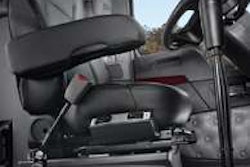 Over-the-road truckers challenge sleeper berth rules.
Over-the-road truckers challenge sleeper berth rules.A refrain heard repeatedly at the latest hours of service listening session was the need for more flexibility in duty-hour and sleeper berth regulations.
At the fourth session organized by the Federal Motor Carrier Safety Administration yesterday, Jan. 28, many speakers said existing rules are too restrictive and lead to increased fatigue, stress and log book cheating. The public sessions are part of another hours rulemaking FMCSA is conducting as part of a settlement with groups challenging the current regulations.
Instead of letting drivers sleep when they need it, log books are managing drivers’ sleep, said Brenda Neville, president of the Iowa Motor Truck Association.
Drivers often lose time in emergency situations such as bad weather or a traffic accident, and such delays count against their 14-hour duty clock, said Kathy Gillaspy, an over-the-road driver.
Tom Bower, a small fleet owner of four trucks and an operator from Kentucky, said the duty rule’s inflexibility causes him and his drivers to lose time. “Waiting can make you more tired than working,” he told an FMCSA panel at the session in Davenport, Iowa.
Ralph Pepper, who’s been driving for 36 years, said the current 14-hour duty period hurts his ability to make a living. “It’s coming down to a stranglehold on drivers out there,” said Pepper, one of dozens of who called in comments.
Chris Perry, who said he’s driven for more than 30 years with more than 3.5 million safe miles, called to say FMCSA treats all drivers the same with the existing regulations. “I’m treated like a rookie,” he said. “I know my limits. I know when I’m tired. I don’t need a babysitter. Before the DOT (Department of Transportation) took over, it seemed a lot easier because we were left alone to do our job, period.”
Attending the session in person, owner-operator Bob Kinsley of Toledo, Iowa, said that although he likes the 14-hour clock and the 11 hours of driving within that, he complained there’s no flexibility to take a nap or a break. “I don’t eat a meal in the truck stop,” he said. “I don’t have the time.”
Sounding the flexibility theme again, 10-year driver Andy Schreiber said, “If I want to pull over and take a nap and wait for rush-hour traffic to die down and do it safely, that should be up to the driver.”
Bob Stanton told the audience “The hours of service guide my life. I have to live by my log.” He also said he has obstructive sleep apnea, which requires him to spend more than four hours per night on pressure on his CPAP machine. He said any split in the sleeper berth time must provide him with at least five hours to maintain his medical certification. “The existing 14-hour and 10-hour rest combination has a major negative impact on my health.”
In his call, William Fields pointed to the excessive demands for speedy delivery as a major problem for drivers. “Ninety percent of our problems with the current rules are created by shippers and receivers,” he said. “They should be included in any new rulemaking.” He also called for more punishment for “companies forcing drivers to violate the rules in the name of money.”
Richard Pingel, an owner-operator who’s leased to an LTL carrier in Wisconsin, suggested simplifying the log book from four lines to two – on duty and off duty. Pingel, who has more than three million miles without an accident, recommended a “graduated log book” for drivers of different experience levels and mileage without accidents. He further suggested implementation of electronic on-board recorders to solve the hours problem.
Harold Babbitt of Babbitt Transportation of Fremont, Neb., said the closure of many rest areas makes it difficult for truckers to find “safe havens” to get rest during their 10-hour rest periods. If truckers park on Interstate exit ramps, they run the risk of getting ticketed.









